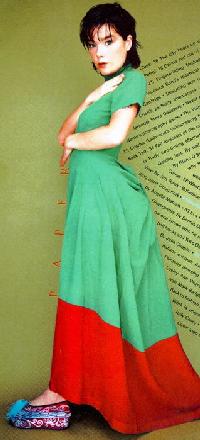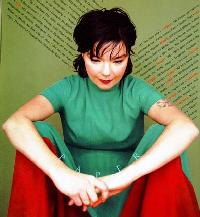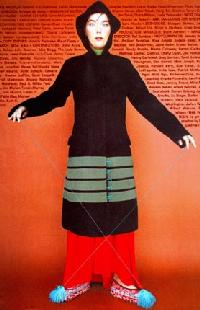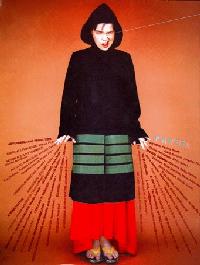Paper 9/97
Army of She - Björk's legions of loversby Julia ChaplinPictures: ? | ||||||||
|
"Ya?" she asks, scrutinizing me with her ice-green eyes. She's trying to prove that her blood vessels mimic the lace pattern on her dress. I think about Galileo and the ships falling off the side of the horizon and I nod, "Umm, hmm." We're in a gondola, being pulled around an algae-green pond in Central Park by a man sporting Venetian stripes in 90-degree, Do the Right Thing heat. Björk is explaining why her latest solo album, Homogenic (Elektra), is all "beats and strings," why it's close to her "heart" (she says the word like a passionate Irishman) and how she's managed to invent a new genre of music that's "sort of like volcanic eruptions" and is the closest thing yet to Icelandic techno. But we'll get to that later. Björk is impatient. Back to the lace.
Björk learned to sing running past the otherworldly landscape of volcanoes and fjords, and she's been blasting the boundaries of music into the outer regions of space ever since. In a single gulp she'll swallow you whole and then hurl you with her galactic chords. Her solo albums of jazz standards, orchestral copulations and dance grooves have made her one of the most versatile and prolific artists of our time. A classically trained musician, she reigned as a sort of Arctic Shaun Cassidy after releasing her first album at 11. She freaked out the rest of the world with her polar-gasm screams on the Sugar-cubes' 1987 hit, "Birthday," and has since collaborated with a motley crew of musicians that includes trip-hop czar Tricky, deaf classical percussionist Evelyn Glennie and Wu-Tang Clan progenitor RZA. She even scared up members of a Bombay film studio orchestra for a track on her first solo album, 1993's Debut. Giggling silver tears all the way, she's managed to flirt with pop culture while remaining its mischievous subversive. It was during the grunge age that Debut made the scene. While all the other bands on the block were bruising it up à la Courtney Love and thrashing "Teen Spirit" angst, Björk just wiggled her antennae at the MTV kids, gave them a baby dinosaur wink and blasted off in shimmery rave gear. Clearly, she was not from the neighborhood. "She's Vegas!" enthuses Wu-Tang's RZA, who holed up for a week last summer with Björk and his clan at New York City's Hit Factory to record two songs. (According to RZA, if all goes well, they might do an album together.) "We brought in some of the New York Philharmonic orchestra, mixed up hip-hop and saxophone," he says. "You can rock it inside a techno club or on the radio. Just like Las Vegas! A lot of people, they scared to be around us sometimes, but Björk just runs around goin', 'Ark ark ark!' It's like we from the same motherfuckin' cusp. She's unorthodox."
In many ways, Björk's life seems to parallel the zany plots of her cartoonlike videos. It's hard not to smile when picturing little Björk hanging out with 20 hulking Staten Island rappers nursing 40s and busting freestyle about fountains and trees into the wee hours until the guys fall asleep in a big pile on the floor. At the recent Tibetan Freedom concert in New York, instead of playing guitar while sitting cross-legged and barefoot like tormented folkie Alanis Morrisette, Björk showed up in a screaming fuchsia Chinese dress busting air with kung fu moves. Supporting her was an eight-piece Icelandic string section and a techno DJ. Unlike many of today's female acts, Björk doesn't strum and whine about her man walking out the door, she jumps in her tank, throws it in gear and hunts the dude down. Or "dudes," I should say. Maybe it's all that clean Icelandic air, but Björk's brand of feminism sure seems like more fun than that of her melodramatic Lilith sisters. Björk has ripped through the British rude-boy DJs (most notably Tricky and Goldie, the latter to whom she was briefly engaged) at record speed. She dated photographer Stephane Sednaoui (who shot her "Big Time Sensuality" video and the Post album cover) and is currently turning up around the globe with U2's Pop producer, Scottish DJ Howie B. Knowing that Björk hates to kiss and tell, I risk some
questions about her "Bedtime Stories" anyway. (Björk
actually cowrote that song for Madonna in 1994, perhaps as payback for the time she went on Icelandic TV, wearing a midriff-baring T-shirt while seven months pregnant, and belted out "Like a Virgin.") Heavy on my mind is the incident last year in which Björk, feeling cornered by a female reporter in Bangkok's International Airport, lunged at the scribe, grabbed her by the hair and banged her head against the concrete floor. (Apparently Björk felt her 11-year-old son, Sindri, who often travels with her, was in danger.
She later apologized, saying,
"You were just in the wrong place at the wrong
time.") But she won't tell much more about her legions of lovers.
"I've also got deep sexual
relationships with the mountains in Iceland," she adds, her
childlike voice suddenly changing into that of a Cockney schoolyard bully.
She picks her nose and catapults the catch to the ground.
"What probably confuses people is they know a lot
about me, but it quite pleases me that there's more they don't know.
"I'd be ashamed to do this interview in Icelandic,"
Some of Björk's impulsiveness may stem from the fact that she grew up with hippie parents on a purple-painted artists' commune in Reykjavik. As a teenager, she recorded an album of national folk songs while studying flute and piano. (Her mom noticed that her five-year-old daughter got "goose pimples" when near the prickly psychedelia of Jimi and Janis and signed her up for music lessons.) Björk "learned early that making hits was not what I'm after," so she became an anarchist, thrashed around in local punk bands for awhile and met Sugarcube cohort and the father of her son, Thor Eldon. Björk says her teenage fame helped prepare her for the inevitable "attention shit" that has cropped up in later rock-star life. Like last February, when a 21-year-old psychotic fan from Florida sent a sulfuric acid mail bomb to her London home before shooting himself in the head with a .38 caliber revolver. Fortunately, the police detonated the bomb at the post office without (further) incident. Apparently, Björk wasn't living up to the deranged youth's idea of family values: in a videotape found near his corpse, he explained that Björk needed to be punished for her interracial engagement to Goldie. Understandably shaken by the morbid affair, Björk now shrugs it off as "hazards of the trade. Stewardesses lose their hair, and when a terrible event happens I have to put up with people waiting outside my house with cameras," she says. "But that same month I may write five great tunes. Music is my obsession, so if a bit of bullshit comes with it, fuck it." As legendary Brazilian producer Eumir Deodato correctly points out, Björk is a creative force to be reckoned with. (Björk hunted him down in upstate New York, where he was living as a stockbroker, after she fell in love with his production of Milton Nascimiento's Travessia.) She signed up Massive Attack producer Nellee Hooper and Tricky long before trip-hop became the Muzak for Contempo Casuals. And when she wanted to get into dance music in the early 90's, she went directly to the source, teaming up with 808 State's electronic mastermind Graham Massey, who later produced "Army of Me." "Most acts were putting out seven-inches with throwaway lyrics like, 'Ooh, baby, baby,'" recalls Massey. "But Björk took that culture and made an album with poetic lyrics. It blew everyone away. She never tried to fit in with any electronic movement, she just took the ideas and got personal with it." When I ask Björk what electronic music she's been listening to lately, she shrugs and tells me she likes tapes of dance grooves that friends make her. What about the Chemical Brothers and Prodigy? "The Chemical brothers are hard rock!" she shoots back. "Americans are so dumb! The one band they pick as electronic, and it's a rock band. It's like MTV did a show with Wu-Tang Clan and called it a rockumentary. It's rap! If it's not four white guys holding a beer, then they don't know what to do with it!""I'm so bored with cowards!" Björk thunders on the Homogenic song "Dare." Arguably her most brilliant solo offering-and certainly her most personal-the album was recorded in a castle in Spain overlooking the mountains and the Sea of Gibraltar. ("It has a lot to do with me being 9,000 miles an hour for four years all around the world," she explains. "I suddenly crashed and found myself in Andalusia.") And where Debut and Post were as unbridled and playful as a manically curious child, Homogenic's vitality stems from mature restraint. The effect is beautifully pared down, with submerged beats-courtesy of LFO's Mark Bell-and the Icelandic String Octet, conducted by Deodato. "It's like me with no makeup," Björk simplifies. (She says this album does not have a producer: "I used to need someone to help me get the song out of my system, but I'm my own midwife now.")
On "So Broken," Björk uses a flamenco guitar and Janis Joplin wails to convey depression "without me sounding like a housewife." And thoughtfully, she ordered all the beats on the right side of the mix and strings to the left so that "your granny or whoever can decide what kind of mood they're in and adjust the levels to have all beats or just beats and strings and so forth." As for the new album's title, Björk explains, "It's really easy to cover an emotional range from joy to angst to stupidity with 59 violas and 33 guitars, but with just two tools it's more of a challenge. More brave. More honest. Debut and Post were like a greatest hits of all my obsessions for the past 15 years. I called this album Homogenic because all the dots are pink-no green or blue-just one flavor." Well, our boat is nearing the dock, we're both sweating like traveling salesmen and I'm no closer to solving the grand mystery of Björk. But at that moment, she pats my knee and starts telling me about "Isobel," the Post ballad inspired by a mythical character she and a friend invented when they were children back in the cold country. According to Björk, Isobel was born in the forest. After the pebbles turned to skyscrapers, she ends up a grown woman living in the city with only instinct as her guide. Isobel dances naked on tables and falls in love with all the wrong people and causes pain. "So she escaped and isolated herself," explains Björk. "That's why she's called Isobel and not Isabel." And now the saga continues in the new song Björk calls both
"Bachelorette" and "bertolucci." (She initially wrote it for Bernardo
Bertolucci's film Stealing Beauty but liked it so much that she kept
it for herself. It now appears on Homogenic as "Shape Shifter.")
"So Isabel decides to return to the city
and to take a train, like in
the 30's, in South America somewhere. She decides to confront love with
love and confronts the cowards that don't have the guts to fall in love with
love. So you see,"
Björk slips me the clue, "it's like Isobel
has returned."
| ||||||||




